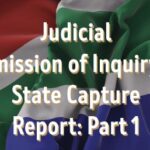It’s been a while. This is my first post since June 2019. Needless to say, life has been hectic, but whose isn’t? To make up for it, here’s a quick post on how South African Twitter reacted to President Cyril Ramaphosa’s 2020 State of the Nation Address (SONA). As a point of reference, take a look at my analysis of the 2017 SONA here where the EFF engaged in similar theatrics against then-president, Jacob Zuma.
This year’s SONA was momentous for a few reasons but perhaps foremost for the government’s commitment towards a renewable energy future for South Africa. Vested interests in the fossil fuel industry have been delaying our entry into a post-fossil fuel future for almost a decade and this SONA seems finally to have heralded the end of that group’s choke-hold on our country. In addition, other important issues were also raised such as infrastructure development, crime, unemployment, gender-based violence, and more.
All in all, Ramaphosa’s address demonstrated that the president has a handle on the core issues facing our country and it gave me hope. However, the president’s talking points wouldn’t necessarily be your main take-aways from SONA 2020 based on a first pass of the data which confirms that the EFF managed to make the SONA all about themselves. It was a somewhat Pyrrhic victory though. While they managed to get the country talking about F.W. de Klerk and his foundation’s temporary bout of Apartheid-crimes-against-humanity denialism (which he forced them to retract), they failed to get Mzansi talking about Pravin Gordhan, the corruption-buster in chief breathing down their neck.
…the EFF managed to make the SONA all about themselves. It was a somewhat Pyrrhic victory though
I collected ~424,000 tweets about SONA authored by ~114,000 unique Twitter users between Monday 10 Feb and Friday 21 Feb 2020. While there was some conversation in the lead up to the SONA on Thursday 13 Feb, and some conversation afterwards, the vast majority of it occurred during the time of the President’s actual speech which started at 19:00 on that Thursday. This chart shows the volume of tweets per minute which obviously spiked during the actual speech at ~2,500 tweets per minute (that I was able to collect anyway; actual volumes might have been even higher):

Here’s what the network of users looked like around this year’s SONA. It’s interesting to see that the EFF and RET influencers along with their respective communities are grouped together by the community detection algorithm. Since about October 2019, they’ve been increasingly singing from the same hymn book, particularly on the topic of Pravin Gordhan. Almost a quarter (23%) of all tweets came from this combined community. Given that this vocal group is a minority in real life, it’s worth reiterating again: “Twitter isn’t real life”. Remember this next time the spectacle and vitriol machine fires up, especially when some media outlets give it uncritical coverage just to reach their daily article quota.

It really was a great SONA that touched on so many issues that we’ve been waiting years to see movement on, including South Africa’s energy future, infrastructure development and burning issues like gender-based violence, so I took a look at the degree to which these and other topics mentioned by the president were discussed on Twitter. Here’s the breakdown of the topics were mentioned the most:

As you can see, Twitter focused on the EFF. This was consistent across all communities – whether they loved them or hated them. However, while they stole the conversation, their agenda was interpreted in the wrong way. The main issue for the EFF was Pravin Gordhan; the main issue picked up by Twitter though was former president F.W. de Klerk’s contention that Apartheid was not a crime against humanity in the same league as genocides committed around the world. Twitter, and South Africa, focused on the sideshow of F.W. de Klerk rather than Pravin Gordhan. The de Klerk topic is emotive for sure. It reminds me of the furore that similarly dug into Apartheid-era wounds when Winnie Mandela’s accused certain journalists of working for Stratcom. The Pravin Gordhan issue however has a direct impact on the EFF leaders’ future, so they got people talking about the wrong topic (in terms of their own futures at least).
We really are just a society of spectacle where real, concrete issues and ideas aren’t debated.
…while [the EFF] stole the conversation, their agenda was interpreted in the wrong way.
After an hour of disruption, the EFF quietly bowed out of the SONA, allowing the proceedings to continue. Let’s then take a look at how the actual address went down. Here are the SONA-related topics that were discussed on Twitter as the evening progressed:

As you can see, once the EFF (red) left the chambers, Cyril Ramaphosa (green) got a lot more airtime. Conversation volumes slowly decayed as the evening progressed but there wasn’t a mass exodus of eyeballs once the Red Spectacle left. Instead, it seems as if people stuck around and actually listened to what the president had to say. And, referring back to our original ranked chart of topics, the things that they mentioned the most were Eskom & loadshedding, unemployment and crime.
So, perhaps we did have a real, engaged SONA on Twitter after all. It just wasn’t the heated, emotive, spectacle-filled event that it started out as. But then, no SONA should be. They are supposed to be dry, boring, business-as-usual affairs, led by capable government servants. I long for the days when business as usual meant not watching the SONA each year to see how we collectively shoot ourselves in the foot; instead resting in the knowledge that the country was in the hands of stuffy bureaucrats who just did their job.




